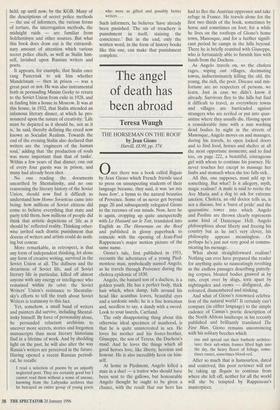The angel of death has been abroad
Teresa Waugh
THE HORSEMAN ON THE ROOF by Jean Giono Harvill, £8.99, pp. 374 0 nce there was a book called Regain by Jean Giono which French friends used to press on unsuspecting students of their language because, they said, it was 'Lin tres beau livre', a hymn to the natural beauties of Provence. Some of us never got beyond page 20 and subsequently relegated Giono to the recesses of our minds. Now, here he is again, cropping up quite unexpectedly with Le Hussard sur le Toit, translated into English as The Horseman on the Roof and published in glossy paperback to coincide with the opening of Jean-Paul Rappeneau's major motion picture of the same name.
Giono's tale, first published in 1951, recounts the adventures of a young Pied- montese man, symbolically named Angelo, as he travels through Provence during the cholera epidemic of 1830.
Angelo, the bastard son of a duchess, is a golden youth. He has a perfect body, thick hair which, when damp, falls around his head like acanthus leaves, beautiful eyes and a sardonic smile; he is a fine horseman and, needless to say, a dandy with a sword. Look to your laurels, Cartland.
The only disappointing thing about this otherwise ideal specimen of manhood, is that he is quite uninterested in sex. He loves his mother and his foster-brother, Giuseppe, the son of Teresa, the Duchess's maid. And he loves the things which all good heroes love, like liberty, heroism and honour. He is also incredibly keen on him- self.
At home in Piedmont, Angelo killed a man in a duel — a traitor who should have been sent to the gallows, but honourable Angelo thought he ought to be given a chance, with the result that our hero has had to flee the Austrian oppressor and take refuge in France. He travels alone for the first two thirds of the book, sometimes by horse and sometimes on foot; for a while he lives on the rooftops of Giono's home town, Manosque, and for a further signifi- cant period he camps in the hills beyond. There he is briefly reunited with Giuseppe, who is fortunately able to furnish him with funds from the Duchess.
As Angelo travels on, so the cholera rages, wiping out villages, decimating towns, indiscriminately killing the old, the young, the rich, the poor. Disease and mis- fortune are no respecters of persons, we learn. Just in case we didn't know it already. Survivors flee to the hills but find it difficult to travel, as everywhere towns and villages are barricaded against strangers who are reviled or put into quar- antine where they usually die. Having spent a considerable time with a nun washing dead bodies by night in the streets of Manosque, Angelo moves on and manages, during his travels, to open locked doors and to find food, horses and shelter at all the most opportune moments; and to find too, on page 222, a beautiful, courageous girl with whom to continue his journey. He never touches her except to massage her limbs and stomach when she too falls sick.
All this, one supposes, must add up to something. But what? Is it allegory, myth, magic realism? A mule is said to recite the Ave Maria and a dog to ask for extreme unction. Cholera, an old doctor tells us, is not a disease, but a 'burst of pride' and the quarantine tower into which Angelo and Pauline are thrown clearly represents some kind of Dantesque Hell. Angelo philosophises about liberty and freeing his country but as he isn't very clever, his philosophy appears meaningless. Or perhaps he's just not very good at commu- nicating his message.
What about straightforward realism? Nothing can ever have prepared the reader for anything quite so nauseatingly revolting as the endless passages describing putrefy- ing corpses, bloated bodies gnawed at by rats, crept over by slugs, torn apart by nightingales and crows — disfigured, dis- coloured, dismembered and stinking.
And what of Giono's renowned celebra- tion of the natural world? It certainly can't compare (in either language) to the simple cadence of Camus's poetic description of the North African landscape in his recently published and brilliantly translated The First Man. Giono remains unconvincing with his solitary beeches which rise and spread out their barbaric architec- ture; their salt-white frames lifted high into the sky, the heavy fleece of foliage, some- times russet, sometimes blood-red.
After so much that is humourless, dated and contrived, this poor reviewer will not be taking up Regain to continue from where she left off, neither for all the world will she be tempted by Rappeneau's masterpiece.


























































 Previous page
Previous page